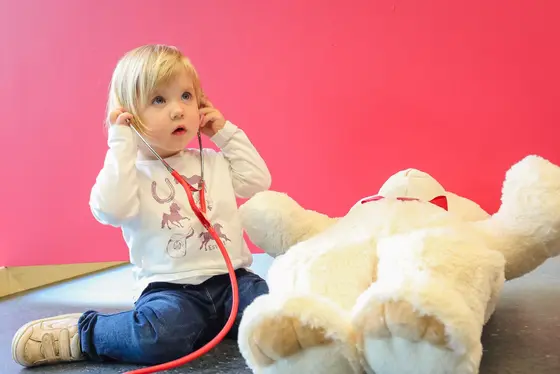The pilocytic astrocytoma (PA) is a brain tumor that is common in childhood and classifies as a low-grade glioma. It grows slowly and can be treated in many cases, especially if it is possible to completely remove the tumor. A protective mechanism, called oncogene-induced senescence (OIS), stops or interferes with the proliferation of tumor cells. This mechanism is considered to be the cause of slow tumor growth in the PA. “Our studies in a cell-based model show that OIS in the pilocytic astrocytoma is regulated by a group of proteins, specifically inflammatory messengers,“ explains Juliane Buhl, KiTZ scientist and lead author of the publication, who now presents the research in Clinical Cancer Research, “Measuring these factors could help to better predict the progression of tumor growth in PA patients.“
In addition, knowledge of this molecular mechanism opens up new therapeutic approaches. Till Milde, group leader at the KiTZ, DKTK scientist at the German Cancer Research Center (DKFZ) and senior physician at Heidelberg University Hospital, explains: “Our discovery shows why many tumors are in a resting phase for a long time, in which they hardly respond to chemotherapy. However, we assume that we can specifically attack the cells with certain drugs called senolytics. Based on these results, we are currently reviewing the possibility of a clinical study with senolytics in pediatric PAs.“
The research has been carried out at the “Everest Center for Research on Pediatric Low Grade Brain Tumors“ located at the KiTZ and the University College of London, UK. The project is funded by the British “The Brain Tumor Charity“ (https://www.thebraintumourcharity.org).
Original publication:
Buhl et al.: The senescence-associated secretory phenotype mediates oncogene-induced senescence in pediatric pilocytic astrocytoma. Clinical Cancer Research 2018. Published online on December 7, 2018
doi: 10.1158/1078-0432.CCR-18-1965. http://clincancerres.aacrjournals.org/content/early/2018/12/07/1078-0432.CCR-18-1965
An image for this press release is available for download at: KiTZ-Patientin-Teddy-med.jpg
Caption:
Pilocytic astrocytoma (PA) is a type of brain tumor common in childhood.
Note on use of images related to press releases
Use is free of charge. The German Cancer Research Center (Deutsches Krebsforschungszentrum, DKFZ) permits one-time use in the context of reporting about the topic covered in the press release. Images have to be cited as follows: “Source: KiTZ“.
Distribution of images to third parties is not permitted unless prior consent has been obtained from DKFZ's Press Office (phone: ++49-(0)6221 42 2854, E-mail: presse@dkfz.de). Any commercial use is prohibited.



